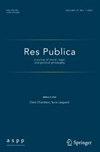Why Deliberation and Voting Belong Together
IF 1.1
2区 哲学
0 PHILOSOPHY
Res Publica-A Journal of Moral Legal and Political Philosophy
Pub Date : 2023-10-18
DOI:10.1007/s11158-023-09635-x
引用次数: 1
Abstract
Abstract The field of deliberative democracy now generally recognizes the co-dependence of deliberation and voting. The field tends to emphasize what deliberation accomplishes for vote-based decisions. In this paper, we reverse this now common view to ask: In what ways does voting benefit deliberation? We discuss seven ways voting can complement and sometimes enhance deliberation. First, voting furnishes deliberation with a feasible and fair closure mechanism. Second, the power to vote implies equal recognition and status, both morally and strategically, which is a condition of democratic deliberation. Third, voting politicizes deliberation by injecting the strategic features of politics into deliberation—effectively internalizing conflict into deliberative processes, without which they can become detached from their political environments. Fourth, anticipation of voting may induce authenticity by revealing preferences, as what one says will count. Fifth, voting preserves expressions of dissent, helping to push back against socially induced pressures for consensus. Sixth, voting defines the issues, such that deliberation is focused, and thus more likely to be effective. And, seventh, within contexts where votes are public—as in representative contexts, voting can induce accountability, particularly for one’s claims. We then use these points to discuss four general types of institutions—general elections, legislatures, minipublics, and minipublics embedded in referendum processes—that combine talking and voting, with the aim of identifying designs that do a better or worse job of capitalizing upon the strengths of each.为什么审议和投票是一起的
协商民主领域目前普遍认识到协商与投票的相互依存关系。该领域倾向于强调审议对于基于投票的决策的作用。在本文中,我们推翻了现在普遍的观点,提出了这样的问题:投票在哪些方面有利于审议?我们讨论了投票可以补充、有时还可以加强审议的七种方式。第一,投票为审议提供了一个可行和公平的结束机制。其次,投票权意味着道德和战略上的平等承认和地位,这是民主审议的一个条件。第三,投票通过将政治的战略特征注入到审议中,从而使审议政治化——有效地将冲突内化到审议过程中,否则它们就会脱离其政治环境。第四,对投票的预期可能会通过揭示偏好来诱导真实性,因为一个人说的话会起作用。第五,投票保留了不同意见的表达,有助于抵制社会引发的要求达成共识的压力。第六,投票确定问题,这样审议是集中的,因此更有可能有效。第七,在投票是公开的情况下,如在代表性的情况下,投票可以引起问责,特别是对一个人的主张。然后,我们用这些观点来讨论四种一般类型的机构——普选、立法机构、微型公众和嵌入公投过程中的微型公众——它们将谈话和投票结合起来,目的是确定在利用各自优势方面做得更好或更差的设计。
本文章由计算机程序翻译,如有差异,请以英文原文为准。
求助全文
约1分钟内获得全文
求助全文
来源期刊
CiteScore
1.40
自引率
0.00%
发文量
32
期刊介绍:
Res Publica: a Journal of Legal, Moral and Social Philosophy is an interdisciplinary publication concerned with the philosophical analysis of moral, political, social and legal issues. It provides a forum for discussion of theoretical issues; a public arena for voicing matters of practical concern; and a vehicle for addressing questions of morality, politics, law and society, the interconnections between them and, more generally, the relation of theory to practice. The journal seeks to publish articles and review essays which are both philosophically rigorous and accessible to a wide range of academics and professionals. Replies to articles are welcome. It is the policy of Res Publica to encourage publication by researchers at the beginning of their careers as well as by established scholars; and by those in non-Western countries.

 求助内容:
求助内容: 应助结果提醒方式:
应助结果提醒方式:


